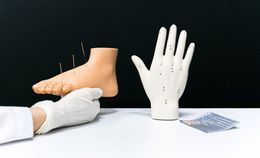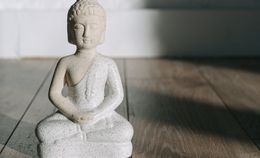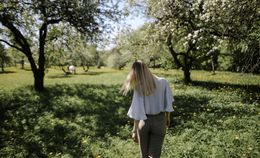Most of us associate spring with renewal and growth and the ushering in of light, warmth and life. We are entering a segment of the year originally named Jing Zhe by the Ancient Chinese. The translation of the name is “The Waking of Insects.” Visually all around life is waking from a deep sleep and not just the insects. Plants, large hibernating animals and yes insects begin to wake, crawling out of their warm winter residences up into the still cool, and in our Pacific Northwest, wet wide world. Jing Zhe is one of 24 annual Jie Qi. What is Jie Qi? The Importance of Jie Qi Since ancient times the Jie Qi (the periods of time within a year correlating to the seasons) have been used to aid human beings attempting to live in harmony with nature. It was considered far more auspicious for one’s fortune, luck, health and psyche to be in harmony with the seasonal energetics present in nature. By doing so, less energy and effort were needed to be expended to boost longevity and health. Each Jie Qi lasts 15 days and has associated signs from the natural world to indicate its arrival. For example during Jing Zhe, the weather vacillates between cold and warm, dry and wet as the Earth moves through transition between winter and summer. Winds will sometimes blow cold from the North and at other times warm from the South, and the fish in the lakes and ponds will stir, and feed on the newly emerging feast of insects. Spring birds arrive, for us in the Northwest typically that means water fowl but also the first wave of song birds. The presence of these natural signs confirms specifically that the Jie Qi of Jing Zhe has arrived. The Rhythms of Our Lives and Our Health The Ancient Chinese recognized a link between the natural rhythms of nature and our own bodies’ rhythms. This is in addition to the cycles we recognize such as menstrual and circadian. For the Ancient Chinese the cycle of the day holds high importance as does the cycle of the year. Why are the firsts few months of the year, the first months of spring when it is so cold? The explanation is in the energetics of this time of year and the importance of movement. The Jie Qi before Jing Zhe is Yu Shui or “Rain Water.” At this transition we are still moving from the coldest part of the year into a time of warming and increased activity. Jing Zhe is the period of the year when we see that the rest of nature is acknowledging that the heat and light are returning (At least in the Northern Hemisphere). It is still cool but with each subsequent Jie Qi of spring, it becomes warmer, until, inevitably in the summer, the hottest day will arrive and cold will begin returning to the world in a perpetual cycle. How Does All This Affect Your Health? The energetic quality of Jing Zhe can be likened to the early blooming of trees or plants as they fully emerge and their buds turn to flowers in the early days of spring. The newly bursting flowers tell us this is the start of a spring, summer and fall full of color. But it is still the beginning, and remnants of winter is still holding on. The energy of early spring is one of a push and pull, likened to a tug-o-war. Temperatures can waffle between extremes and the climate can be in violent transition with windstorms and blustery precipitation. As with nature, our bodies can struggle to transition between wakefulness and slumber while wrestling with fatigue and constraint. Have you noticed how many people experience lingering cold or flu this time of year? How much more difficult it is to wake in the morning feeling rested? Do joints and muscles seem more sore and tight? This is because our bodies are still emerging much like the animals and plants in nature and as nature is in struggle to emerge out of winter slumber, our bodies are effected similarly. It can be a difficult time to stay healthy because of changing temperatures, wind, and other climactic factors. There is a reason that many cultures, not just the Ancient Chinese, use to encourage early spring tonics to help give the body an immune boost and to keep people’s systems from stagnating causing aches and pains and many internal problems. Those same spring tonics not only helped to boost immunity but also regulate it. It is said the best time to treat allergies is in the spring before they start. Liver and Lung tonics are best used before any symptoms emerge. The tonics usually clear out winter stagnations and boost organ function. This is how they reduce symptoms of seasonal allergies, through systemic desensitization and improved function. Acupuncture also helps mediate immune sensitivity and White Center Wellness Clinic has our own “spring tonics” specifically designed for your body’s rconstitution. A series of acupuncture treatments starting now can help ease those symptoms. Personalized medicine for you to help reduce those annoying symptoms of seasonal allergies. Self-care during Li Chun Activity We encourage our patients to get active in spring time, especially outside. Even more so on warm, sunny days with little or no wind. We don’t recommend excessive sweat but gentle activities that support the health of your muscles and joints. Yoga, qi gong, tai chi are all great practices as are walking and swimming. If you insist on tough work-outs then build up to those intensive activities and limit them to a couple times a week with the remainder days being either rest days or reserves for less intensive work outs. And though important whenever we exercise, it is especially important to warm up our muscles and joints and stretching them before and after a work out this time of year. We need to literally wake our muscles and joints up. Sleep During Jing Zhe rest and sleep cycles should follow the light of day. Even Western science is beginning to acknowledge the importance of the body’s circadian rhythms for good long-term health. We recommend going to bed no later than 11 pm (but earlier is better) and rising as early as 6 am. Stretching in bed or beside the bed on waking is a perfect practice. As nature herself is stretching and reawakening, so too does your body need to be gently eased into the wake of day. Diet The best foods to eat to help our bodies wake with the season are those that have a “waking and warming up” quality in their nature. For example some traditional foods and spices the Chinese encouraged are things like mustard, ginger, leeks, chives, raisins, duck and spinach are all great as they have an awakening and warming effect on our bodies. At this time avoid liver, fermented foods, garlic, rabbit, lamb, pepper and white wine and reduce the amount of cold drinks, and shellfish as these all are considered to have a detrimental effect to the waking energies needed this time of year and are considered more appropriate during other times of the year. Teas are always helpful, year round, but some are specifically beneficial at certain Jie Qi intervals. For the next two weeks we recommend Ginger black tea with a little bit of natural sweetener. It will give your body a gentle wake up and boost. White Center Wellness can help During Jing Zhe, it is important to be well rested and to keep your body and muscles flexible, strong and gently active. If you are noticing your body is already suffering from the ailments that can be pervasive during Jing Zhe like fatigue, depression, lack of motivation, manic behaviors, the start of seasonal allergies, aches and pains, or easily pulled muscles, schedule an appointment today. We at White Center Wellness Clinic can help return your body to a state of health through acupuncture, medicinal herbs and bodywork. A treatment can feel like the deep breath before waking and the morning stretch from slumber that is critical for one to be in a healthy state of being, not only to start your day, but to be prepared for the promise of a productive spring and summer to come. Consider White Center Wellness Clinic your partner in restoring and maintaining a healthy balance. Book an appointment today!

Lee offers acupuncture, herbal medicine and other East Asian health therapies.

















